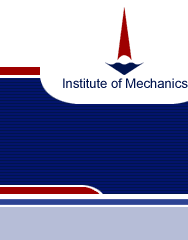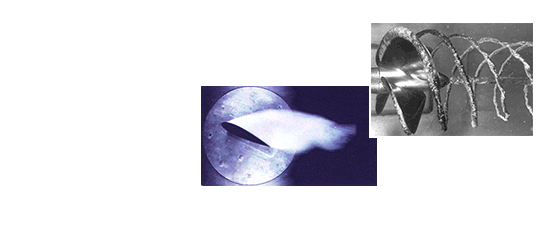|
|
|
General information
Research directions:
- Study of steady and unsteady fluid flows and motion of bodies in fluid and gas
- Analysis of methods for drag reduction of bodies moving in fluids and of fluids moving in pipelines by using compliant coatings
- Hydroacoustic tests
- Analysis of methods for delay of laminar-turbulent transition in free jets
- Experimental and theoretical studies of fluid motion in spherical layers, including transition to turbulence
- Linear and nonlinear problems of aeroelasticity and flutter
- Stability analysis of flows of rheological fluids in collapsible tubes
- Transition to turbulence in expanding channels
- Influence of cavitation on hydrodynamic properties of bodies moving in fluid
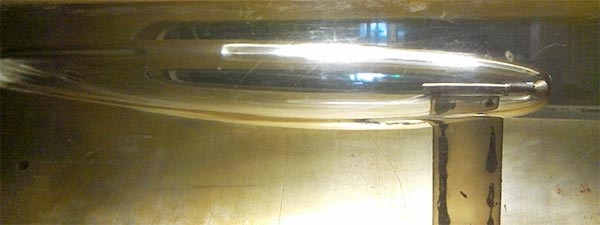
Ventilated cavity, generated by a disc in a water flow.
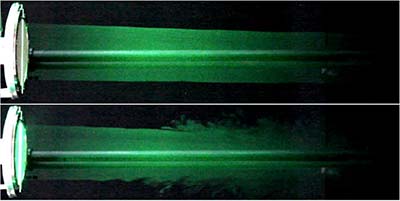
Free jet with relative length of laminar region L/D=5.5 (Re=9200), and 2 (Re=1750), seeded with glycerin particles, illuminated by a laser sheet.
Results obtained and their applications
During the history of the lab, various studies of fluid flows and analyses of hydrodynamic characteristics of bodies have been conducted.
A lot of applied studies have been conducted in collaboration with industry: NPO Mashinostroyeniya, “Region” Scientific & Production Enterprise JSC, Novator Design Bureau, RSC Energia, Gas-Turbine Engineering RPC “Salut”, Radio research and development institute, and others.
Results of these studies are used in:
- ship design
- aviation and space craft design
- oil and gas industry
- pipeline transport
- chemical industry
- biology
- medicine
- urban engineering
- sport equipment design
In particular, many scientific and applied results obtained in the lab are used in the design of military, aeronautics and space techniques.
The lab has suggested and verified methods of modelling of various natural processes in the water tunnel. In particular, a method for measurement of hydrodynamic properties of bodies moving in the fluid, based on tests on half-model, has been designed.
Many control tests in other water and air tunnels, and tests in natural conditions have certified the realiability of results.
The research conducted was awarded by USSR State Prize, Zhukovsky and Sedov prizes, Keldysh and Kapitsa medals.
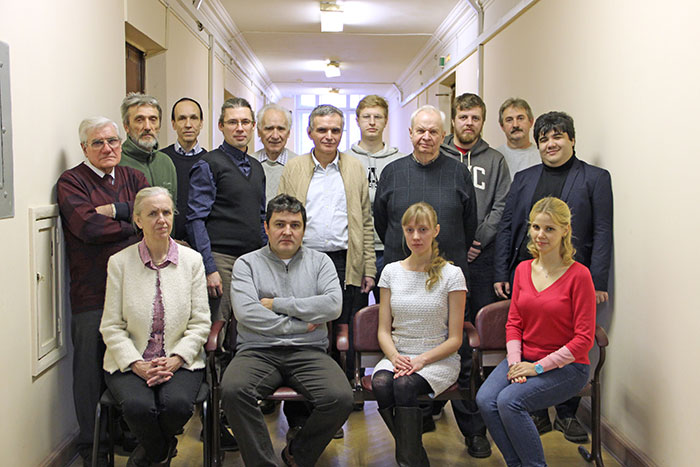
The lab team in 2017.
Collaboration
Laboratory is interested in collaboration with scientific organizations, industrial companies and design bureaus.
Topics for collaboration:
- Experimental studies in hydrodynamics of bodies moving in fluid, including modelling of natural and ventilated cavitation. New methods of drag reduction of bodies moving in fluid. Hydrodynamic properties obtained can be used in the design of ships, submarines, rockets, etc.
- Development of devices for creation of clean zones, where the air has a controlled level of contamination and chemical composition.
Clean zones can be used in medicine, pharmacology, industry of microelectronics, etc.
- Study of aeroelastic phenomena (divergence, flutter) of aviation and space structures (aircrafts, helicopter blades, rockets, space structures). Aeroelasticity of rotor blades (jet engines, water turbines, gas and steam turbines).
- Computer simulation (including simulation of experiments). The laboratory has its own computational facilities; also, numerical simulation can be run on Chebyshev and Lomonosov supercomputer clusters (the most powerful computers in Eastern Europe). We use both in-house codes, as well as industrial software: Ansys Multiphysics, Star-CCM, FlowVision, Abaqus.
By combining experimental studies and numerical simulation, we can conduct unique complex studies of various industrial problems in hydrodynamics, aerodynamics, and aero-hydroelasticity.
Teaching
A number of laboratory members are full and associate professors of Department of Hydrodynamics at the Faculty of Mechanics and Mathematics of Lomonosov Moscow State University.
As a part of a teaching plan, the lab is responsible for practical training in hydrodynamics for undergraduate students of the Faculty of Mechanics and Mathematics of Lomonosov Moscow State University.
Address: Institute of Mechanics, 1 Michurinskii prospect, Moscow, Russia.
Telephone: 8-495-939-52-83, 8-495-939-52-90.
E-mail:
|
